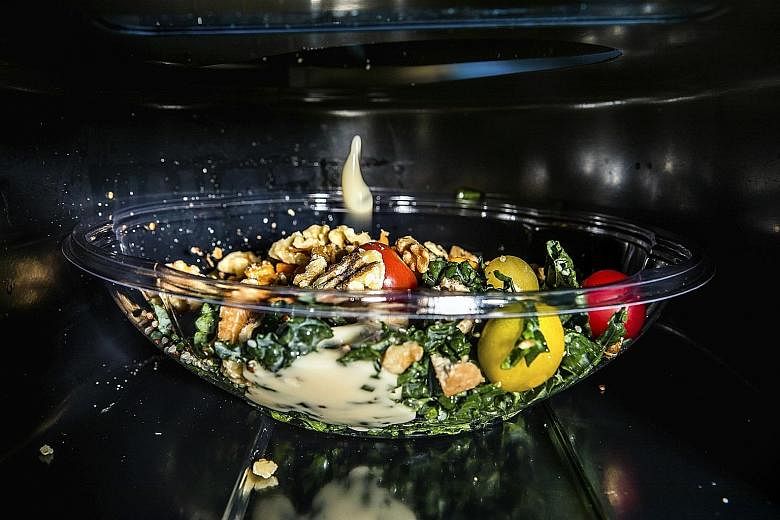NEW YORK • Silicon Valley start-up Chowbotics has devised a robot, which it calls Sally the Salad Robot, aimed at reducing the risk of food-borne illness by assembling salads out of pre-cut vegetables stored in refrigerated canisters.
Diners use a touchscreen to place their orders, choosing from a menu of recipes or designing their own salads. The machine calculates the number of calories for each salad and drops the veggies into a bowl in less than a minute. There is less human contact with the food.
But as a growing number of food-and drink-slinging robots have begun interacting with diners in the San Francisco Bay Area, Mr Deepak Sekar, the device's inventor and founder and chief executive of Chowbotics, has faced questions about whether his machine will put people out of work.
He denies that will happen.
He insists that his company's focus - which is on the salad bar market instead of restaurants more broadly - means Sally will not be a job killer.
He says workers at salad bars could restock the robot, which holds enough ingredients for 50 salads before it needs to be refilled. And, he says, restaurants can continue with their usual food preparation methods - relying on kitchen workers to do the chopping or buying pre-cut vegetables.
In offices, the gadget could be a source of new jobs, Mr Sekar says. "You're going to get fresh food in and you're actually creating jobs for people who refill the canisters in these offices."
Nonetheless, robot-induced unemployment is a mounting concern. Microsoft founder Bill Gates recently made a case for taxing companies that own robots, which could delay their implementation and provide some money to retrain people whose jobs are lost.
The San Francisco board of supervisors is considering a so-called robot tax.
"We could be looking at over 50 per cent of jobs disappearing in the United States over the next 10 to 15 years," said Ms Jane Kim, a San Francisco supervisor. "And it's not jobs going abroad or offshoring of jobs. It's robots."
There is evidence that automation can have a devastating effect on employment. Commercial robots have already begun to eliminate jobs, according to a Massachusetts Institute of Technology-Boston University study published in March.
Researchers analysed the effects of industrial robots on local labour markets in the US from 1990 to 2007, and estimated that adding one robot for every 1,000 workers has led to unemployment for up to six workers and has caused a decrease in wages by up to 0.5 per cent.
The robot is being tested in the office of the Redwood City, California, technology incubator GSVlabs and at Calafia Cafe and Market A Go-Go, a restaurant in Palo Alto, California, with an attached market owned by Chowbotics executive chef Charlie Ayers.
This autumn, Chowbotics will begin fulfilling orders for 10 robots, priced at US$30,000 ($41,000) each, said Mr Sekar.
He envisions his robots producing healthy meals in convenience stores, airports, hotels, hospitals and universities.
If Chowbotics succeeds with salads, he hopes to expand to other cuisines and admits that human workers could then be displaced.
"We're going to go after other types of food," he said. "It's hard to tell what will happen in the future and how this all might impact jobs."
NYTIMES

